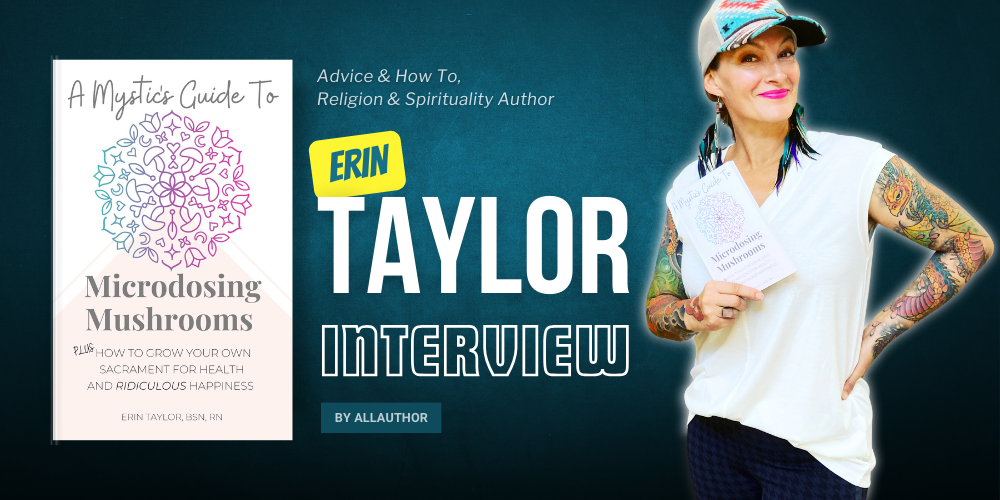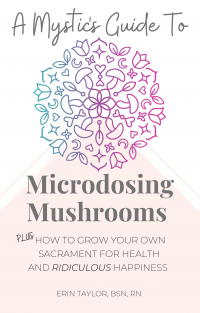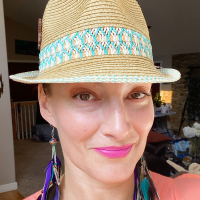Erin Taylor Interview Published on: 26, Feb 2024
 Being a 4th generation writer in your family, how has your family's literary background influenced your writing style and approach to storytelling?
Being a 4th generation writer in your family, how has your family's literary background influenced your writing style and approach to storytelling?
Honestly, very little. The primary way would be my sheer passion for writing- an intuitive knowing, if you will, that writing is just "in my blood". My great-grandfather was an author of many books and a playwright. He would write and recite poetry in front of the fireplace mantle to my family. My grandfather ran and wrote for a local newspaper. One of my uncles was also a journalist.
What inspired you to transition from a long career in western medicine as a pediatric critical care and ER nurse to exploring alternative healing modalities such as meditation coaching, hot yoga, Reiki, and shamanic sound practices?I have always been pulled towards health and healing. I was a registered dietitian and very involved in fitness before my 12 year career as a nurse. As a nurse, I quickly realized there was little opportunity to support people with healing modalities in Western medicine, and if there was opportunity, there was little room for freedom within that realm. I don't do well being put in a box! I didn't realize I was in major burnout at the tailend of my nursing career; I just followed my intuition and the "threads of joy" towards studying what healing modalities resonated with me.
Can you share a specific moment or experience that led to your decision to leave the traditional medical system due to burnout and frustration?At the end of my 12 year nursing career, I was having major lower back issues, debilitating anxiety, and an uncomfortable increased distrust in the medical system. I naively thought I was "immune" to burnout because I had had a daily meditation practice for 8 years at that point, and took very good care of my body. I started to act in ways that were very out of character for myself- like being short-tempered at work and having intrusive thoughts which were extremely worrisome. The morning I quit my nursing career, I had what felt like a panic attack and severe abdominal pain that dropped me to my knees. In hindsight, the burnout was blaringly obvious for several years before I actually retired from nursing. Retiring from nursing was very difficult for me; I felt as though I was giving up on the children and families I took care of. When my body and mind were screaming at and giving up on me, I had no choice but to listen.
How did your background as a Registered Dietitian influence your perspective on health and well-being, especially in the context of alternative healing practices?Much like nursing, I realized even as an RD, there was little room (at least back then) for freedom of personal practice within the realm of nutrition. Much like nursing, everything had a protocol or agenda behind it. I felt very much boxed in, and I yearned for more freedom to offer healing modalities that resonated with me. Food is an instrumental ally in supporting and motivating our bodies to heal and be balanced.
What motivated you to learn about mushroom cultivation and the various uses of mushrooms, and how has this knowledge contributed to your overall approach to wellness?The mushrooms "found me" at the tailend of my nursing career. I received a free book in the mail, "Santa Sold Shrooms", which to this day is my favorite book of all time. It tells the story of the REAL Santa Claus, who was actually a Scandinavian Sami shaman and gave the world's most famous mushroom, the Amanita Muscaria, to his village people to heal. Around the same time, a family member started digging a room under his house to start growing gourmet mushrooms to sell to local chefs and markets. That project fizzled out for him, but by then I had been bit by the mushroom bug and my curiosity was insatiable. I started noticing the shiitake mushrooms at the grocery store, which were selling for $18 per pound compared to other gourmet mushrooms selling for much, much less. I started to question, "Who is growing these mushrooms?!?!". Since that time, my obsession with all types of mushrooms continues to grow today. Like food, mushrooms are valuable allies that offer a wide range of healing opportunities for the body, mind and soul.
The Church of The Divine Heart, which you founded, focuses on supporting US military veterans with financial funding for psilocybin therapy. What inspired you to establish this unique organization, and what impact have you observed on veterans who have undergone psilocybin therapy?I always wanted to offer a women's healing retreat. After Denver decriminalized psilocybin in 2019, I hired an attorney, Sean McCallister, to help me see my dream to fruition. He helped me found The Church of The Divine Heart, which back then was protected under the Religious Freedoms and Restoration Act. In 2022, I had my first and only women's psilocybin healing retreat here in Colorado. I learned after the retreat that retreat work is not for me, and I needed a bigger platform to help people heal their own lives with psilocybin. 9 months later, Sean McCallister wrote the legislation that ended up decriminalizing psilocybin for all of Colorado, so the mission of the Church shifted towards a population that has always been near and dear to my heart, our US military veterans. As early as the end of 2024, Colorado therapists will be able to offer psilocybin-assisted therapy to veterans. The VA (Veterans Administration) is finally recognizing the massive benefits, backed by science, of psilocybin-assisted therapy for depression and PTSD. For the first time since the 60's, the VA is funding and looking to offer this incredible healing modality to tackle the epidemics of suicide and PTSD with our US military veterans. 44 military veterans take their own lives everyday. This statistic was recently doubled, when the US government decided it was time to include opiod overdoses in the statistic. One of many instrumental studies on the subject, conducted at Johns Hopkins University, shows a remarkable finding: Just two macrodoses of psilocybin, coupled with therapy, offers substantial relief from depression for 12 months or longer.
Your book on microdosing psilocybin was published in June 2023. What prompted you to write about this specific topic, and what key messages or insights do you hope readers will gain from your book. "A Mystics Guide To Microdosing Mushrooms”?In 2020, I listened to "How To Change Your Mind" by Michael Pollan. I decided to start microdosing and quickly learned how powerful and transforming this medicine, combined with spiritual and integration practices, was in my own healing journey from a lifetime of traumas. In my own research, I realized how profoundly misleading, out of reach, and even dangerous most microdosing information distributed to the public is. When you are living with a history of trauma, it is often terrifying to embark on a macrodose journey to tap into these traumas. From my own experience, I learned that microdosing with regular integration practices, coupled with trauma therapy, as well as growing your own medicine, was a safe and very "doable" approach to healing from traumas. I wanted to offer a method that promoted sovereignty from "the systems" to empower people to be the guides of their own healing journeys. So I wrote my book!
How do you balance your passion for alternative healing practices and mushroom cultivation with your love for writing and spending time with your husband in the Rocky Mountains?I go with the flow and follow the guidance, wisdom and cycles of nature and my intuition.
Can you share any challenges you faced during the process of transitioning from a traditional medical career to exploring alternative healing methods and founding a psilocybin-focused organization?As a solopreneur, especially in the psychedelic and alternative healing world, you often feel like a lone soldier (pun intended) out on an island by yourself. Coming from the "safety" of a J-O-B in the western medical world where you are surrounded by a team all the time, this was a major shock to me, but one I embraced. Through this challenge, I have learned to be even more of a resourceful problem solver than I was as a nurse, to be patient, and mostly, to trust myself and surrender to the "knowing" that the Universe will always provide what I need, when I need it.
What role do you believe meditation coaching, hot yoga, and other mindfulness practices play in overall health, and how have they personally contributed to your well-being?Mind body practices are essential for health and well being. Hot yoga (Bikram style) is essentially a moving meditation. It is so easy for us to think that if we are exercising our bodies and eating clean, we are healthy. But if we are not tending to our mind, to our inner world, which is a direct mirror of our outer world, we are leaving out a key piece of the wholeness puzzle. People tell me all the time, "I can't meditate". The spirit knows balance, so if you are challenged by meditation, it is your spirit calling you towards balance, and guiding you to lean into meditation. Do you have to sit in lotus pose for an hour everyday to meditate? Absolutely not. There are many ways to access meditation that don't require you to be Buddha-like. Take a mindfulness walk, go swimming, cook, journal, just sit and observe your thoughts...there are so many ways to access meditation, where your whole life and day can become a meditation. Meditation and mind body practices are daily rituals which have become the foundation for my wellness and healing journey.
As someone deeply involved in alternative healing, what changes would you like to see in the perception and integration of these practices within the mainstream healthcare system?Western medicine tends to focus only on the body and the parts. I have seen this improving, where organizations are offering meditation to employees, and also offer massage to patients and at least see the benefit of ancient healing modalities like acupuncture and the chakra system. I hope this trend continues to grow to incorporate the spiritual and emotional bodies, as well as the mind body connection, and the importance of community. One of my favorite quotes, which I share on my newest piece of work I'm publishing, Health Benefits of Mushrooms: Ignite Wellness and Spiritual Growth!
Share Erin Taylor's interview
Erin Taylor, a seasoned professional with over 2 decades in western medicine as a pediatric critical care and ER nurse, also a Registered Dietitian. Transitioning from burnout, she delved into meditation coaching, hot yoga, Reiki, and shamanic sound practices. She authored her first book on microdosing psilocybin in June 2023, continuing a 4th generation family tradition. She cherishes writing and Rocky Mountain moments with her husband.
 A Mystics Guide To Microdosing Mushrooms: Plus How To Grow Your Own Sacrament for Health and Ridiculous Happiness
Genre: Advice & How To, Religion & Spirituality
A Mystics Guide To Microdosing Mushrooms: Plus How To Grow Your Own Sacrament for Health and Ridiculous Happiness
Genre: Advice & How To, Religion & Spirituality

